#once monthly discourse post
Text
Is it just me, or does lesbian fandom have a problem?
My name is Edil. I've been a medium-sized name in several small fandoms, especially podcast fandoms. I am also a women appreciator, and enjoy media that centers on women. I'm going to mostly be talking about my experiences in two fandoms: The Strange Case Of Starship Iris and Pasithea Powder, both podcasts with central wlw ships, though I've also seen these same issues in Goncharov (1973) of all places.
When I go into fandom I go hard. My brain, which is very autistic, breaks down information of small details for fun. It's the reason why I wrote a dwarnian (TSCOSI's fictional alien language) dictionary for the podcast. The reason why I have a massive notes document on all of Pasithea's season one and the reason the wiki...looks and reads like that. It isn't owned by me, but most of the formatting, fonts, content: yours truly.
And I'm proud of these projects, which took time and effort and skill building to do! But I haven't finished or caught up with either of these podcasts, and that's because the online spaces that center around them have been overwhelmingly hostile.
I have a strong emotional connection to this issue — of whether or not sapphic fandoms tend to be more hostile to diversity, especially race and nuerodivergance — so I can't make a distinct analysis, not without more distance and more information. That's part of why I am making this post.
Mods and members of the TSCOSI discord circa 2020 will know me, and know why I left. That being a series of unwarranted criticisms and bad faith readings that left me with anxiety even interacting with the fandom I loved.
I am probably a lot less known in the Pasithea fandom, because I wrote fewer fics for it and left more quickly. After TSCOSI, I recognized resentment faster. But the Pasithea notes document that I've posted here before and the wiki, three fics, fan art and that one comic that's still to this day the only comic I've drawn: me.
This is not a callout post, not for individuals or for groups, and I don't have screenshots. I am only trying to open a discussion.
See, the pattern that I am seeing is that fandom spaces centering on wlw ships attract fans who are wlw. And while nothing is inherently wrong with that, issues in the lesbian community start to become very obvious.
Firstly, the lack of diversity in sexuality among most of the fan base (As I suspect bi and gay people have largely more popular media that attracts them, and lesbians have to dig deeper for smaller spaces like these podcast) starts to feed this sense of possession among fans. As if there is a correct, normal, or standard way to be sapphic. A set of rules stating that anyone who doesn't obey it hates lesbians.
From Pasithea, I got this in comments about how I was drawing the characters "ugly" (Jane is canonically fat and has a scar, which I made very visible...because I wanted to. I gave her strong Hispanic features because it appealed to me. Sophie is butch, and canonically has or had a buzz cut. Which is what I drew. — The "appearance" section of the wiki? Yup. I wrote that.)
These comments, which were themselves problematic, came from a place of implying I was lesbiphobic for drawing these wlw as "ugly". When in fact, I was drawing the type of characters that would appeal the most to me, and hopefully to others like me.
These expectations of skinny, eurocentric appearing, usually feminine characters... Well it reflects a lot of issues with TERF-y feminism and lesbianism at large. Lesbianism on the internet has an issue with gender essentialism that isn't universal but is incredibly worrying. And when WOC are often masculinized because of their non-white features, that transphobia becomes anti-butchness (or strict standards of butchness) and racism.
While TSCOSI fans were more receptive to my designs, I was drawing in a less realistic style where "ugly" was less of an issue — and, to be frank, The main ship being Southeast and South Asian made it hard to draw them "ugly" from a eurocentric perspective. Realism there would just be...exotic, I guess.
However, with TSCOSI fans there was still a sense of possession around how these characters were interpreted, especially in headcannons, that lead to me deleting more than I posted as time went on. Some of those were genuine issues on my part ("what if the Jewish guy was a vampire in a au haha!" I said. Then went to bed, woke up, googled it, and went "NOPE! NOPE!!! SORRY.") Others were just unnecessary, such as comments on how silly head cannons were "unrealistic", and how I should write more cannon compliant work, rather than what I was doing for fun.
Ultimately these are the ONLY things that made me stop listening to these podcasts. The ONLY reason I put down the projects I poured consecutive hyperfixate weeks into. Part of me thinks it was this enthusiasm in the first place that was the biggest threat others reacted to in how I spoke and acted.
For instance, in trying to write for both the TSCOSI and Pasithea wikis, I had folks try to change my methods of research and writing to a style that worked best for them. When I said they were welcome to work that way, there was no offers to assist. And communication with those who had established work was either non-existent or hostile. I've had people question if my passion projects were necessary, berate me for meaningless mistakes, and treat what could be fun collaborative work like a pissing contest. For TSCOSI, none of this occurred on the wiki, and mostly around documents I owned for my own note taking. Even then, the hostility of Wikipedia culture is an unnecessary and hurtful thing to bring into fandom wiki culture.
The TSCOSI people went on to make a wonderful wiki that I deeply admire, but I still wish I could have been part of that project in its infancy, instead of being pushed away. (I may have made the navigation system if I remember correctly, but I'm not certain. So this is not to say I was not allowed any input whatsoever.)
I love sapphic media, it's my bread, butter, pride, joy, and favorite past time. But time and time again I have found far safer social spaces for media that centers around gay men, even if it isn't my personal first choice.
As a non-white, non-allistic, non-lesbian, not-skinny fan...I have concerns.
I know you all want sapphic media to get more attention. I want that too. But unless you start actively searching for and calling out bigotry in those spaces, it absolutely cannot and will not happen. So much of fandom is powered by autistic people with time on their hands, and I want there to be space for people like me. Who get TOO excited, TOO far from cannon, TOO analytical about race and class and fatphobia and whatever else.
Sapphic media obviously has issues reaching fans that aren't the fault it's its current audience. But the good thing about being part of or close to a problem, is having the power to make incredible, effective change.
I refuse to leave these podcasts behind, I love them more than anything, and the projects I got out of them are still my beloved brain children (The alien calligraphy from the random writing system I made for dwarnian is still up on my wall. "It is what. It IS what, keeps us from the abyss.") I refuse to be shoved aside my racist fans and random people who assume they can act rudely to strangers because they treated characters or lore differently. I refuse to be sidelined from conversations just cause I can act weird.
But I also refuse to spend so much of my beloved labor on people who turn up their noses and belittle it.
This all has had a lasting effect on how I interact with fandom, a legitimate fear-responce to the idea of trying to engage deeply with women-centered podcasts. Something I'm trying to unlearn and overcome.
So. There's my explanation of why I don't do tscosi anymore, which I mentioned on the minibang I'd eventually follow up on. And a criticism of sapphic fandom which, I'll be real, I have a few more essays worth of commentary about, and it's also another expression of how I stare longingly at Pasithea every time it comes up on my dash.
But, most importantly, this is my question of whether anyone else has found themselves in a similar place. If it's a trend or an anecdote.
If you have thoughts, please reblog with them. I'd love to know what you have to say.
#this is going on several sideblogs because its relevant to all of them#edil chats#once monthly discourse post#i guess#everytime i use that tag i hesitate to do it but thats also the point#sapphic#fiction podcast#t3p#the pasithea powder#pasithea powder#the strange case of starship iris#tscosi#yup#this is the kinda post i might have to deactivate over but :P i wanna say what i have to say#goncharov (1973)#elevator pitch podcast#where i expirienced but the same but it lasted me about 4 days cause i learned to see the signs faster
49 notes
·
View notes
Note
Apologies if this has been answered before. When and why did you make the decision to not release through COG/HG?
I haven’t answered this before, because I hadn’t mentioned it outside my Patreon until that post, lol.
There were a few reasons, but the primary factor was COG’s policy regarding Patreon. When I first started my Patreon in… 2018, I think? I had talked to Jason personally via PM about the limits of what I could offer on there, given ChoiceScript’s license. At some point the policy for authors’ Patreons changed, and I confirmed it with Jason over PM.
The policy change was regarding early access content for authors who featured that as reward on their Patreon. It had originally stated that any content in the Patreon-only version(s) of the game had to be made publicly available — in a beta version or what-have-you — after two weeks:
Any ChoiceScript-based content that you give to your patrons must be released to the general public within two weeks of giving your patrons access.
While talking about this with Jason, I suggested they change that to a month, since Patreon operates on a monthly cycle, and fortunately they did, which I think was a very good decision for many authors with Patreons.
Unfortunately, it didn’t make any difference for my own situation, so I eventually decided to move Seven Heirs to Twine. Again, there were some other reasons for this decision, but I consider this to be the real catalyst.
It was not a decision I made lightly, as Seven Heirs was fairly successful on the forum, and I received a lot of helpful and high-level feedback on there that I (personally) don’t believe Tumblr is as conducive to. I think a forum like Discourse creates a better environment to have a proper dialogue with readers on what works and doesn’t work in a game. It allows for an actual back and forth. And, in my own experience, the lack of anonymity on a forum sometimes fostered a bit more… “professionalism,” for lack of a better word, in the interactions between author and reader. Not always, of course, but still, lol.
I had my share of really, really bad experiences on the forum, but it is still the thing I most regret having to leave behind in switching from ChoiceScript to Twine.
Once I have things a bit more settled on my end, I do have plans to address that, the current lack of a proper community for Seven Heirs’ readers, but for the moment the actual game itself is my priority.
I hope this answered your question!
38 notes
·
View notes
Text
TikTok dances have captured the attention of countless U.S. teenagers—and TikTok has captured the regulatory attention of the U.S. government. But the deeper threat to U.S. freedom is from another Chinese-owned app—one with a much broader reach into the wallets and conversations of both Chinese and Chinese Americans. WeChat is China’s “app for everything,” but as some Chinese Americans have found out, “everything” does not include free cultural or political discourse.
Imagine a fusion of WhatsApp, Twitter, Facebook, Instagram, and PayPal. This is WeChat—an immensely popular app in China and Chinese-speaking communities around the world because of its wide range of functions, including texting, calling, video conferencing, playing video games, shopping, paying bills, sending money to friends, creating information feeds for friends, and reading news. Released by Tencent in 2011, it is the largest standalone app in the world, with over 1 billion monthly active users.
WeChat’s widespread use among Chinese-speaking Americans makes it an important source of news for the United States-based Chinese diaspora, including international students, first-generation Chinese Americans, and others. This has driven an explosion in WeChat-based media targeting the audience. And once adopted, WeChat is far more all-encompassing for its users than TikTok or any comparable U.S. app. In a sense, it is not just an app but an add-on operating system for smartphone communications in Chinese.
WeChat’s popularity makes it a key part of the Chinese Communist Party’s (CCP) surveillance and censorship apparatus. User activity is tracked, analyzed, censored, and handed over to the Chinese government in line with Party mandates, making it a prominent part of the party-state’s mass surveillance network in China. Algorithms are adjusted to promote the Party’s narratives and demote or censor information that runs against it. Those who post information that challenges these narratives face a range of possible consequences, including banishment from the app, as happened to several users who shared images of last year’s pro-democracy demonstrations, and imprisonment, which can happen for sharing as little as one wrong post.
But even using WeChat outside of China—beyond the immediate reach of the authorities—is a fraught experience.
For example, the most common way for WeChat to censor users in the United States is to block access to the account from China or for anyone using a Chinese phone number for their account, meaning that even though a censored person can log in and access the app’s various functions, very few people can see that person’s texts or moments. A more severe form of censorship is to completely block access, meaning that the user cannot even log into their account; while this occurs more frequently in China, it does happen in the United States. Alternatively, WeChat can completely block specific content released by a user without the user’s knowledge; users would only know by monitoring the responses (or lack of them, in this case).
For those who come directly under the eye of WeChat’s controls, the damage is even more direct. Lydia (Yang) Liu, a Chinese immigrant with a Ph.D. from University of North Carolina at Chapel Hill, started a public WeChat account, MoshangUSA, in the spring of 2018. Liu’s aim was to tell “the truth of real American life to Chinese immigrants in the [United States] and worldwide,” as she told me, and she worked countless hours over three years to build her WeChat account. MoshangUSA became one of the largest outlets on social media focused on social, cultural, and political issues among first-generation Chinese immigrants in the United States. It garnered over 250,000 followers and millions of monthly views.
But promoting a positive understanding of life in the United States—and its democracy and freedoms—challenges the Chinese Communist Party’s narrative about the country. This narrative, which is propagated over and over again in China through television, movies, social and print media, print media, and even posters on the subway and construction sites, emphasizes the Party’s almost messianic role in restoring China’s glory after a long period of humiliation (and the concomitant demise of the Western powers that caused it).
Even though Liu intentionally self-censored many topics, MoshangUSA was suspended from WeChat first for two weeks, and then for six months. Posts that undermined the Party’s narrative—by, for example, not taking a pro-China stance on the U.S.-China trade war or Covid-19, or by exploring the positive aspects of immigrants’ experience in the United States—were taken down. Dozens of articles were disqualified before publication, and over 40 were removed after publication. Comments were similarly censored. Meanwhile, Liu was repeatedly harassed, and even doxed by some combination of state-backed and independently-acting nationalist users.
MoshangUSA is hardly the only Chinese American account to be targeted. The CCP, through both direct action and pressure on companies, manages content according to Party narratives in various ways: suspending or shutting down particular accounts, censoring some posts and elevating others (often indirectly, via algorithm), flooding moderate groups with extremist users, creating favorable content (propaganda), and leveraging its rules system to limit who can establish public accounts.
First, independent WeChat accounts that cover news have had experiences similar to MoshangUSA. These accounts include Newslab, which was founded by a University of Pennsylvania graduate student with a background in journalism; Yalerica Road, founded by a Chinese American professor; and Chinese Americans, established by a group of Chinese American progressives. Each account garnered an estimated 50,000 to 300,000 followers before being shut down by WeChat in the past two years. Chinese Americans was shut down after it ran an article in the week following the 2020 U.S. presidential election celebrating that “America was back, and democracy won.” When Yalerica Road was shut down, the founder released a message stating: “It was a very dark night to me …. [It] woke us up one more time that we need to allow critical voices for a brighter tomorrow.”
In addition, journalists and commentators connected to outlets critical of the CCP regularly have their posts deleted, accounts shut down, or are expelled from chat groups, according to a Freedom House survey.
And while WeChat censors or demotes content that is positive toward the United States, negative posts about U.S. life go viral daily, ensuring that United States-based Chinese speakers who use WeChat to get their news regularly see content promoting critical narratives—such as that the United States treats Chinese as second-class citizens, that white people always discriminate against Chinese people, and that the country is a gun-violent society. The CCP’s goal is to suppress Chinese and Chinese American passion for U.S. politics and make users believe that the U.S. political system is no better than China’s authoritarianism.
Indeed, the Party proactively supports favorable outlets that support its narratives, ensuring their posts are readily promoted and that they can grow without interruption. For example, the account Cicero2020 grew rapidly after its inception in November 2020 because WeChat repeatedly recommended it to MoshangUSA readers while never doing the reverse; eventually about one-third of users migrated over. While Cicero2020 claims to be independent, the account manager is a former journalist of a state-owned media outlet who lives in China.
The Party also encourages the development of extremist voices that can both discredit the United States and its democracy and exacerbate divisions among users. For example, right-of-center groups are flooded with far-right voices that question the integrity of U.S. elections, spread QAnon misinformation, and support Putin’s war in Ukraine. GoWest, whose owner is based in Seattle, Washington, and claims to be Chinese American, regularly circulates content on both WeChat and Telegram suggesting that the U.S. “deep state” is worse than the CCP, that the U.S. Democratic Party is really the American Communist Party, and that the media in the United States is so biased it’s even worse than China’s state media. The intensity of posting and circulating of content suggests GoWest has several editors and many volunteers supporting its efforts.
The CCP’s fourth method of control on WeChat is “flooding the zone” with content creation. A group of state-backed internet commenters nicknamed “wumao” (loosely translated as “fifty cents” after the amount they were supposedly originally paid per post) operate like a propaganda apparatus, creating articles or comments on social media in China and abroad that promote the party-state’s narratives while undermining anything that might challenge them. The Wumao Army numbers anywhere from 500,000 to two million employees within China, with more overseas. Many of the wumao commenters working on U.S. WeChat are based in the United States and have already acquired U.S. passports or green cards. The FBI and other U.S. government agencies lack the understanding of CCP activities and resources to constrain them.
The consequences for targeted WeChat account managers and content posters can be dire. The CCP requires that any public accounts making more than four posts a month be registered in China. Registration means either setting up a presence in China (a highly regulated process) or is dependent on the support of someone in China (leaving that person vulnerable to jailing or pressure tactics). Media companies that refuse to register in China, such as the Epoch Times or other anti-Party outlets, are unable to establish a WeChat account and therefore have no presence on the app.
Even if they live in the United States, those affected are reluctant to publicize harassment or censorship for fear of consequences for their family members. For example, Chen Xiaoping, a journalist for the Chinese-language Mirror Media Group based in Long Island, New York, interviewed the exiled Chinese billionaire Guo Wengui. Shortly afterward, Chen’s wife, who was living in China, disappeared. After he published an open letter on Twitter asking for her release, she appeared in a video on an anonymous YouTube account denouncing his work.
As a result of all the actions against her and MoshangUSA, Liu is off social media today. “This kind of insane pan-platform sabotage has really killed my social media career,” she said. “I cannot fight a machine as an individual.” Meanwhile, GoWest and other outlets such as Tensor Torch (绿网) that promote CCP-backed content have expanded their presence to Telegram and other platforms—everywhere Chinese speakers may seek out news and congregate—to continually crowd out independent voices.
WeChat enables the Chinese party-state to do much more than just manage information that millions of Americans access day in and day out. It provides a mechanism to infiltrate the Chinese American community and stifle its social and political development. As such, it is part of a broader campaign to control Chinese American organizations, civic engagement, and political participation. As Alex Joske and his co-authors concluded in a 2020 Australian Strategic Policy Institute report: “WeChat has accelerated the growth of CCP-aligned media. Its account registration restrictions and unclear censorship process have discouraged political content, contributing to a lack of political awareness among Chinese communities and leaving them vulnerable to manipulation.”
These methods of control give the CCP the capacity to influence U.S. politics in ways that are not easily visible to U.S. government officials and others who monitor foreign meddling. For instance, the Party uses the app to stifle the reach of Chinese American political candidates who take a strong anti-Party stance—such as Allen Shen, a Chinese-born U.S. Army veteran who ran as a Republican for a seat in the Minnesota House of Representatives. Shen said he was unable to post on WeChat because of his political positions. Lily Tang Williams, formerly a law professor in China, ran in a GOP primary for Congress in New Hampshire; she said she avoided anything that might be deemed political while on WeChat, out of concern for her relatives in China.
The activities and methods outlined above explain why the Trump administration tried to ban WeChat from U.S. app stores in 2020 on national security grounds. The ban was blocked by a federal judge. While the Biden administration has ordered a security review of foreign-owned apps, it is likely much more concerned with TikTok because it is omnipresent among U.S. youth today, and concerns about data privacy are generally more politically salient than concerns about foreign agents publishing content in a foreign language. What occurs on WeChat is hidden in a language few people in Washington or the U.S. media understand. What happens in Chinese stays in Chinese.
But given that WeChat is likely to both grow in importance to users and in influence over Chinese language media in general, the Biden administration should elevate its assessment of the threat it poses—not only to personal data but to political discourse and civic engagement among U.S. citizens. All social media apps in the United States should be required to adhere to U.S. standards of free speech and privacy, with major platforms assessed for compliance.
If Tencent (WeChat’s parent company) cannot ensure that public WeChat accounts targeting U.S. audiences are easily registered in the United States, communications outside China are no longer monitored, posts and accounts are not censored, algorithms are not systematically promoting anti-U.S. content, and wumao commenters are not advantaged, WeChat should be banned in the United States. While this would surely inconvenience users who depend on it to communicate with family and friends in China, there are alternatives—Signal and Telegram use is surging in China and there are other options. And it is a small price to pay for enjoying the freedoms the United States offers—freedoms that are limited by WeChat. In addition, foreign ownership of major public accounts—the equivalent of major media on the app—should require public reporting. Such efforts should be paired with outreach to other democracies to ensure Beijing’s long arm no longer reaches into the information public square of the free world.
2 notes
·
View notes
Text
Tips for Young Bloggers: The Art of Mastering Article Reviews and Role of Specialized Apps
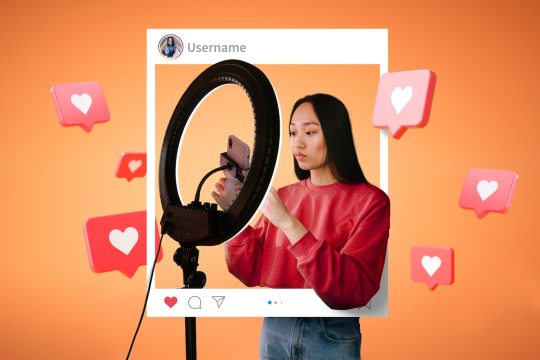
In today's ever-changing digital landscape, blogging has emerged as a powerful platform for young individuals to express their thoughts, share their passions, and engage with a global audience. Aspiring young bloggers have the potential to influence and inspire others through their words. A crucial skill that can enhance their blogging journey is the ability how to write an article review. This skill involves critically analyzing and summarizing a piece of writing, offering valuable insights, and fostering meaningful discussions. In this article, we will explore essential tips for young bloggers, with a special focus on mastering the art of article reviews to enrich their blogging experience and connect with their readers on a deeper level. Also we will look on specialized mobile apps, like https://essaypro.app/, that will help you write article review.
The Art of Writing an Article Review
Learning how to write an article review is invaluable for young bloggers, as it allows them to engage with the work of other writers and contribute to the intellectual discourse within their chosen niche. To master this art, follow these key steps:
Choose a Relevant Article: Select an article that aligns with your blog's theme or interests, ensuring it comes from a reputable source and provides valuable insights or meaningful content.
Thoroughly Read the Article: Begin by carefully and attentively reading the chosen article. Take notes on important points, key arguments, evidence, and any questions or critiques that arise during the reading process.
Concisely Summarize the Article: In your review, provide a clear and concise summary of the article's main points and central argument. Focus on effectively conveying the author's message.
Analyze the Content: Offer a critical analysis of the article's content, discussing the author's use of evidence, the strength of their arguments, and any gaps or limitations in their research or approach.
Provide Personal Insights: Share your thoughts, opinions, and reflections on the article's content. Discuss how the article relates to your blog's theme and how it contributes to the broader conversation in your niche.
Encourage Thoughtful Discussion: A well-written article review can spark meaningful discussions among your readers. Encourage your audience to share their opinions and engage with your review in the comments section.
Define Your Niche and Target Audience
For youthful bloggers, characterizing a specialty and recognizing their target gathering of people are fundamental for building a steadfast readership and setting up their blogging character. A specialty alludes to a particular zone of intrigued or skill that sets your web journal separated from others. Centering on a specialty permits you to set up yourself as an specialist in that field and pull in like-minded perusers who share your interests.
Distinguishing your target group of onlookers makes a difference you tailor your substance to meet their needs and interface. Understanding who your readers are, what they are seeking out, for and what challenges they face will guide your substance creation and engagement methodologies. Building a solid association together with your target group of onlookers cultivates a sense of community and energizes customary readership.
Develop a Consistent Posting Schedule
Consistency is key to building a successful blog. Young bloggers should aim to develop a regular posting schedule that aligns with their niche and audience's preferences. Whether it's posting once a week, bi-weekly, or monthly, maintaining a consistent schedule helps readers know when to expect new content and encourages them to return for more.
Creating an editorial calendar can be helpful in planning and organizing your blog posts. Outline topics, ideas, and publication dates to stay on track and ensure a steady flow of content.
Write Engaging and Original Content
The heart of a successful blog lies in its content. As a young blogger, focus on creating engaging and original content that captivates your audience's attention. Share your unique perspectives, experiences, and insights to set your blog apart from others in your niche.
Use a conversational and relatable writing style to connect with your readers on a personal level. Encourage feedback and interaction by ending your posts with thought-provoking questions or calls to action.
Embrace Visuals and Multimedia
Incorporating visuals and multimedia elements can enhance the appeal and readability of your blog. Images, infographics, and videos can complement your written content and make it more engaging. Visuals not only break up long blocks of text but also help convey information in a more digestible and memorable way.
Ensure that any media used in your blog is relevant, high-quality, and properly credited to respect copyright and intellectual property rights.
Interact and Engage with Your Readers

Building a sense of community around your blog is vital for fostering reader loyalty and encouraging repeat visits. Interact and engage with your readers by responding to comments, answering questions, and acknowledging their contributions to the discussion.
Encourage dialogue and feedback by actively participating in online communities, social media platforms, and forums related to your niche. Connecting with other bloggers and content creators can also open up opportunities for collaboration and mutual support.
Be Open to Learning and Improvement
As a young blogger, be open to continuous learning and improvement. Stay updated with industry trends, best practices, and new technologies that can enhance your blogging experience.
Seek feedback from your readers and peers to identify areas for growth. Embrace constructive criticism as an opportunity to refine your skills and elevate your content.
Conclusion: for young bloggers, the journey of sharing their ideas and passions with the world can be both exciting and rewarding. Learning how to write an article review is one valuable skill that can enrich their blogging experience and foster meaningful interactions with their readers. By defining a niche, identifying a target audience, maintaining a consistent posting schedule, creating engaging and original content, embracing visuals and multimedia, interacting with readers, and staying open to learning and improvement, young bloggers can pave the way to building a successful and impactful blog. Embrace your passion, share your voice, and let your blog be a platform for inspiration, connection, and growth in the digital age. Happy blogging!
0 notes
Text
every once in a while (usually on a pretty consistent once-monthly basis) I see one of my mutuals posting abt how The Discourse Is Too Much Its Way Over The Line Its Gone Too Far. i am like a king in my castle I could look out the window & see the fighting but my curtains are drawn. I am living a lavish life of peace and joy etc
#this metaphor does not imply that i am the cause of the fighting (me being a bad ruler and my citizens revolting)#it implies that my kingdom is small enough that i can see the fighting happening outside of it#lynn can talk actually
1 note
·
View note
Text
As I’m noticing more and more of my peers shutter their blogs, I’m starting to realize the occultblr/witchblr community is pretty cyclical. I think many of us who joined the site or made our magic specific blogs a few years ago have noticed that many of the blogs we once looked up to and learned from are long gone, trickling out and deactivating for one reason or another. Eventually that spot, however charitably or uncharitably you wish to view witchblr readership and influence, is taken by the people who learned from them. And in time, if they grow disheartened by the performativity of mixing social media with their craft, or frustrated by prying or lazy anonymous askers, or fear that others are using the work they’re so passionate about to make a shallow facsimile for themselves rather than pursue their own more genuine path, they too leave for other platforms or to close off that part of their life from the public entirely.
While I have no immediate plans to leave Tumblr, as I still have many resources and friends here I wish to keep up with, I won’t be surprise if my dashboard becomes unrecognizable in the years to come. I also know that I’ve taken a bit of a step back from posting here over the past few months, and while my follower count exceeds what I ever expected for this blog, I’m not even someone who gets daily , weekly, or even monthly questions, nor do I dip my toe into the discourse if I can help it.
Always remember to save the posts that you’d kick yourself later for losing, lest you end up with a masterlist of dead links.
112 notes
·
View notes
Text
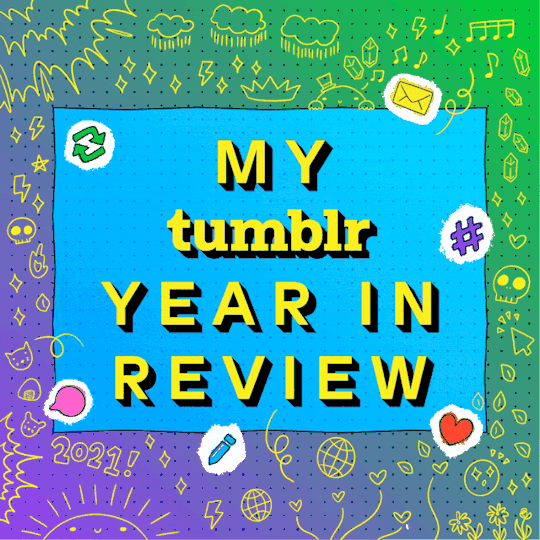
I posted 31,889 times in 2021
1659 posts created (5%)
30230 posts reblogged (95%)
For every post I created, I reblogged 18.2 posts.
I added 3,009 tags in 2021
#q - 1468 posts
#ask games - 343 posts
#danger days - 206 posts
#tlotfk - 178 posts
#spn - 149 posts
#discussion group - 147 posts
#anonymous - 145 posts
#drug ment - 144 posts
#kastana - 121 posts
#alcohol ment - 108 posts
Longest Tag: 140 characters
#lmk if u want me to say more but at the very least my canon cherri's relationship to maleness as a defined thing would probably get him call
My Top Posts in 2021
#5
if anyone is looking to support the Unist’ot’en Camp Legal Fund here's a link to their don*tions page. you can donate once, become a monthly member, or purchase some of their merch!
415 notes • Posted 2021-11-21 00:25:06 GMT
#4
god. evidently daily reminder that discussing and calling out racism isnt ‘discourse’ or ‘fandom drama’
421 notes • Posted 2021-03-09 16:18:17 GMT
#3
its always so funny to see a picture of gerard serving cunt in some little stage costume and the other three are just wearing like. a t shirt
523 notes • Posted 2021-06-12 22:35:29 GMT
#2
okay DNI: 5’6 men, anyone that’s bleached their hair ever, people that have had dyed red hair, wear black nail polish, scorpios, anyone with an aries best friend, have tattoos, pierced ears, lip(s), or nose, played in school band, wore youth large in their twenties, ever kissed a boy, can’t sing, people who are lactose intolerant, anyone that’s ever been to australia, people with lots of cousins, stoners, people that cut their own hair, dated anyone who’s last name starts with n, been hit by a car, or don’t want people knowing you write angsty poetry
5244 notes • Posted 2021-02-16 05:11:22 GMT
#1

[Image ID. Detailed digital art of a skeleton holding 2 guns and pointing them at the viewer. It has an angry expression and is yelling. It's wearing a torn cloak, leather pants, leather holster/belt, long chain necklace with a pendant with a skull on it and 4 metal claws dangling from it on smaller chains. It's got 2 bandoliers, belts holding bullets, strapped across its chest. Aged white text at the bottom of the image reads "Antimaskers can gargle my dick and balls." End ID.]
76968 notes • Posted 2021-05-14 06:26:11 GMT
Get your Tumblr 2021 Year in Review →
#i KNEW what my top two posts would be this is so fucking funny#thank god i edited that last one this is hilarious
7 notes
·
View notes
Note
Explain the female gaze thing because I’m an idiot and I never understood it to begin with
OKAY. SO.
the female gaze is, first and foremost, not a thing. that’s my thesis statement and i’m sticking to it.
the male gaze isn’t technically a “thing” either. there are still many debates surrounding it because it’s not a fact or style. it’s a concept proposed by the film theorist laura mulvey. the gist is that film is often meant for a heterosexual male audience, and through that lense we see women as objects for men’s enjoyment.
take megan fox in transformers v megan fox in jessica’s body, for example. in transformers she has some semblance of a character and motivations, but every shot of her frames her as someone to be ogled so absolutely no one remembers the fact that she was written as a real person. she is presented through the male gaze. the narrative is basically saying “here’s this woman. she is meant for you. she is not real and she’s yours to enjoy.”
jessica’s body, however, subverts this idea and uses it to make a fantastic statement. it shows this woman (who is usually portrayed as a sex object) being openly promiscuous, but she is distinctly not written for men. the men who sexualize her in the film are either the villains of the story or are punished specifically for viewing her as something for them to enjoy. this is a perfect example of a movie that subverts the expectations of the male audience because megan is does not appeal to the male gaze, though she’s expected to be.
but THIS IS STILL NOT THE FEMALE GAZE.
many people try to turn this theoretical framework around on men to show that “hey, the female gaze is real !! chris hemsworth is shirtless !!” films sexualizing men in the way women are usually sexualized does not mean the female gaze exists, because there is no power imbalance. men cannot be viewed as objects because they are not regarded as objects by society. even when they are portrayed like this, they are viewed as something to be desired, not something to be consumed.
the first supposed explanation of the “female gaze” i saw on tiktok was this very nice girl explaining that she thought the closest equivalent would be framing the men in the movie as kind and emotionally vulnerable. her example was that scene in pride and prejudice where mr. darcy flexes his hand after touching the main characters (fuck if i remember her name. i’ve only seen the movie once.) this is an interesting concept, but it’s distinctly not the equivalent of the male gaze. viewing a woman as an object to be consumed and viewing a man as desirable based on their personality and actions are, quite fucking obviously, not the same.
so when i see shit about “haikyuu is written from the female gaze” i get furious.
first of all, nothing is written from either of these supposed gazes. The male gaze is a way a piece of media can be interpreted and it was specifically meant for studying film. It’s not a form of writing or style directors go for. It’s about the way the film language and narrative are interpreted, not intentionally framed.
but also, shut the fuck up. haikyuu is not written from any fucking gaze. haikyuu is just well fucking written.
just like pride and prejudice is well written. and monthly girls’ nozaki-kun is well written.
oh, funny. both of these were written by women. does that mean they’re written through the female gaze. NO. it’s just that more male writers are misogynistic pricks than women and that affects how well they’re able to write narratives about or for women. why do you think warm bodies is so bad ?? because the author doesn’t view women as people. neither does horikoshi I MEAN WHOOPS WHO SAID THAT ???? CERTAINLY WASN’T ME.
so yeah. encourage narratives written by women because they’re better for women. support works of art that are well written because then maybe people will have to pull their heads out of their asses and use an ounce of empathy or understanding for once. but don’t try to act like you’re smart because you took a film theory, misunderstood it, turned it around, misunderstood that, and then tried to cram it into a completely different framework. so shut the fuck up before you embarrass yourself more.
also fuck you furudate’s gender is not confirmed. suck my dick you pretentious fuck.
anyway lila kinda popped off in this little post and then here are two videos (one and two) by lindsay ellis about the male gaze and feminist theory in transformers. it’s so good. she’s so good. this series is all about film theory specifically as it relates to transformers and i think that’s so fun.
anyway if you’re reading the end here thank you for your time and i hope you have a lovely day. i know y’all didn’t follow me for feminist theory and film studies discourse but here we are ig.
#i got heated at the end there whoops#hope the two of you that read this enjoy my rage lmaoo#meg’s messages 📫#🗯..not haikyuu
22 notes
·
View notes
Text
Next year if anyone who isn't a poor abuse-surviving nonbinary transfemme woman-aligned butch-presenting intersex mixed black indigenous afrolatina lesbian with 4c hair who fails the paper bag test (and YES we need receipts) so much as thinks the D-slur, the twitter panopticon will shoot them on sight and sell photos of the body as NFT queerphobia indulgence tickets at pride.
Oh you were reading Leslie Feinberg? Who even is that?
#once monthly discourse post#jesus i do not envy whatever the lesbian community has going on at all times#edil chats#gun mention#death mention
3 notes
·
View notes
Note
This blog is why we need post-birth abortion rights for women. Your mother would have made the right choice.
yes wow darling very smart you sound incredibly intelligent for sending this yes yes quite an outstanding achievement you got there, amazingly brave too, yes such courage to go on anon and insult people, wow i applaud your bravery truly
my blog is a HP blog with ocassional diverse content, you're getting mad at a joke post that's probably 4-5 days old by now (i'm not sure about this exactly as i lose track of time easily) that described a real medically documented experience a lot of trans women have been observed to go through as their transition and therapy continues which i said is similar to a period of a cisgender woman because of the very real similarities between the two processes
i very clearly stated twice that they are biologically different but still similar enough to warrant validation
i support trans women and i always have and i always will, they are real women just as much as i am. i also understand, unlike most of you getting mad in the notes of the post, that women are not walking talking uteruses and i do not reduce nor define women by that one thing alone because that would be ridiculous and hurtful, since there is more to being a woman than just having a uterus
i don't really see why everyone is so upset (transphobes gonna transphobe i suppose) that i called a trans woman's cycle period like or a pseudo period, when that is the most accurate term that exists for that process as of right now.
what else would you call hormonal fluctuations of estrogen and progesterone (because guess what? trans women do in fact receive estrogen and progesterone injections as part of feminizing hormone therapy) and other symptoms (abdominal cramping, headaches, acne breakouts, hot flashes, dizziness, mood swings, pain, nausea etc.) happening every 5 weeks and lasting for 6-7 days? that's right, everyone would call that a period, it's just the most accurate way to describe the process.
trans women can not menstruate, they can not bleed because they do not have a uterus (something i very explicitly stated in my post explaining my point but transphobes can't read apparently) but, like I said in my original post, the bleeding is honestly the least important byproduct of a period, or better yet, the entire cycle, because it is just that - a byproduct, a consequence of the uterine lining shedding. it is not the one defining staple of a cycle, a lot of cis women don't menstruate but you don't go around calling them fake so. the bleeding is not the goal of a monthly cycle, it is not the end result your body wants to reach (the end result would ideally be pregnancy), just a consequence of the process, and i argue it is the least important part of it, its nothing more than another symptom, just like the cramps and pain are
do you want to know what your entire argument sounds like? let me demonstrate:
person A comes in with a fever, a sore throat and a runny nose. their doctor tells them they have a cold.
person B comes in with a fever and a sore throat but no runny nose. their doctor tells them they're faking their cold and should stop pretending to have a cold because it is insensitive to people who have real colds since person B hasn't presented every single typical byproduct and symptom having a cold produces unlike person A did
yea? isn't that ridiculous? that's exactly what you sound like
'trans women experience every other symptom of a period i do, on a monthly basis like i do, lasting about a week, like mine do, but they don't experience this one specific symptom that i typically do which is bleeding therefore they're fake'
obviously the cycle of a trans women isn't going to be the same as the cycle of a cis woman, i have not once contested that nor have i equated the two, what i have done however, is defend the fact a lot of trans women do in fact experience their own form of a monthly cycle that actually presents all the symptoms of PMS (if we're going to be super picky about it) and I've stated that there is nothing wrong with a trans woman calling her own cycle a period, even if she does not experience the bleeding.
you all are just incredibly transphobic (i checked out some of the blogs replying and found them to be terfs, ew) and i don't want to cross into your territory any more than i've already ended up doing, and i will not be responding to any of your notes or anon messages anymore because i've moved on from that post and you should too, because it is obvious you will never understand what i'm trying to say and i will never understand the hatred you spew
it is telling though that terfs and transphobes came across my post which was in the 'pro trans' tag, i assume while casually browsing there for people to start fights with? very telling indeed.
i will be a doctor by the end of the year and i do not have time to argue with transphobes online over matters of trans health they know nothing about (my knowledge is far from perfect either because i am not transgender but i have listened to trans people and read about what transitions can be like because i wanted to learn and feel comfortable stating what i have). ive seen y'all constantly talk about indigestion and diarrhea which have absolutely nothing to do with the matter at hand and seen some people bring up endometriosis which also has nothing to do with the matter at hand, no one is talking about disordered periods or other health conditions, we're talking about just the regular period of a healthy person
people have asked me to provide proof i'm attending medical school which i don't think i can provide without giving out my personal information which i am not inclined to do to strangers on the internet and a lot of people didn't believe me but honestly that is not my problem
i know who i am and what i stand for and the thing i said is a true factual experience that many trans women go through as their transition continues and calling that cycle they experience a period hurts no one and only helps trans communities
of course terfs and transphobes don't care about that, which is why i urge everyone to go their separate ways. i do not want your transphobia on my posts and you don't want my activism on yours so if you're itching to comment and get pissy with me or send me anons, kindly don't because i truly couldn't care less about your opinion on matters you know nothing about and don't care to learn about either
coming from one cis woman to another, just scroll past me and any of my posts from now on and i'll do the same for you so that we may never have to interact again in any way shape or form
i'm closing my end of the discourse of the post right here with this and i stand by what i said. i believe you are wrong for invalidating the experiences of trans women and transphobic for wishing ill upon the trans community in general and i do not wish to ever associate with any of you ever again
i have said my peace
goodbye
(if any trans woman or trans person in general wishes to correct anything wrong i stated here please feel free to do so, because i am cisgender and you will of course know more about your transition and experiences than me no matter how much reading i do :)) remember you are valid and loved and pls stay safe <33)
#pro trans#positive trans#again i reiterate#PRO TRANS#THIS IS A PRO TRANS BLOG#A SAFE SPACE FOR TRANS PEOPLE#trans health#trans women are real and valid#i am not having this argument anymore#i don't like fighting and i don't care what transphobic women have to say#trans support#this cisgender women stands with the trans communities
8 notes
·
View notes
Note
By no means do I want to invite discourse onto your blog, so please do not feel at all obligated to answer, but I was wondering what you thought of the titular happy ending. Obviously, it's sparked a lot of debate, and your takes are always so compassionate and articulate and insightful. Have a lovely evening regardless, and thank you for everything you've contributed to this fandom!
a few things to start… first of all, thank you for asking this in such a non-confrontational way. i haven’t seen much of whatever debates are happening as most of it has managed to stay out of my inbox this time thankfully (i hope i’m not jinxing myself by responding to this lol), though i feel like i can assume the shape of some of the broad strokes of it. i say that just to mean that this shouldn’t be taken in any way as a response to any particular posts/people but just as my general thoughts on the ep. and of course, as i always try to remind everyone, my opinion certainly isn’t the only one that matters, and everyone is entitled to feel however they feel about this (or any other) plot line on the show. i’m certainly not the be-all, end-all of schitt’s creek opinions, nor do i want to be.
anyway, let’s talk about the happy ending…
the first thing i do any time that there’s something on the show that seems to throw people off in some way is to take a step back and try to think about what that particular scene/plot was trying to accomplish. and honestly, the first goal of the show is always that it wants to make you laugh. it’s a comedy. while it means a lot to those of us who love it so deeply and have watched it so carefully, and while there are certainly moments–more and more frequently throughout the years–of great depth and heart and drama, it is still at its core a comedy, and some scenes are really just meant to be a laugh and not hold some kind of earth-shatteringly deep revelation, and i honestly think this is one of them.
i mentioned in some of my speculation earlier this season that i thought we (def including myself there) were in danger of trying to connect too many plots in a way that the show historically hasn’t really done, and i think that some of the negative reactions to this may be the same kind of thing, that we sometimes take things too seriously on a show where historically most of the plots of most of the eps aren’t really meant to be that serious. think about “love letters” for instance. so many people were (and still are) upset about how patrick reacts to the robbery, and sure, i get that he could have been nicer and considered that david and stevie didn’t know the robber didn’t actually have a weapon and that they were frightened, etc etc etc. but also, it’s a comedy. it wasn’t supposed to be some kind of treatise on the right and wrong ways to respond to traumatic situations; it was supposed to be funny and that’s that. the characters clearly have moved on by the next time we see them–david doesn’t seem to be harboring some kind of resentment for the way that patrick responded–and we shouldn’t take it any more seriously than they do.
the show is actually really good at telling us what’s serious and what isn’t, if we just listen to it, and it’s definitely telling us this particular plot isn’t meant to be That Serious. patrick, despite having his understandable initial wtf kind of moment about it, has already by the end of the scene accepted that it was a miscommunication (and one of his own making at that–i mean he does leave the cash and the note, plus he tells david specifically before he leaves that “it’s all taken care of and i’ve told them we need you calm today, so just let them do their job,” so he recognizes once he starts thinking about it just how david could have thought this was what he intended to happen), and he’s already thinking about how some day down the road it’s just going to be yet another story that’s part of their history. he’s clearly still excited and happy when we get to the wedding. he obviously still chooses to marry david that day. so while any of us personally may have reacted differently in this situation, the show is telling us that patrick ultimately isn’t particularly bothered by what happened, that this isn’t supposed to be taken as some kind of serious, make-or-break moment in their relationship. it’s really just supposed to be funny–something to help break up the heavier emotions of the episode. now we may personally disagree on whether or not we actually find it funny, but that seems to be most of the intent either way.
if you do want to take it somewhat more seriously though (because i mean that’s what we do in fandom right? lolol), i think you have to look at it in the context of what this season has been trying to accomplish with their relationship. season 4 is all about those tentative first steps of falling in love. season 5 builds on that to give us all these hallmark relationship moments. season 6 then lets us see what life looks like when the romance isn’t quite as new, when you’ve found enough safety in each other to allow yourself to be seen at less than your best, to make mistakes, to disagree, to explore, to fight when you need to, to know that you can get it wrong sometimes because your partner will always be there to catch you if you fall, because you’ll fall together and pick each other back up, again and again. that’s what love looks like long-term. that’s what marriage looks like. and that’s what this season has given us a taste of.
for example, david, though he’s embarrassed by The Incident, still comes back to patrick’s apartment at the end of the day, allowing himself to be more fully seen (and thus more fully loved) in the light of patrick’s understanding. patrick, who we know has struggled with always trying to make himself be the person other people want him to be–the perfect boyfriend, the perfect son–lets himself crack open a bit, allowing those truer, messier emotions to spill out, letting david actually see his frustration about the spray tan because he knows by now that it won’t scare him away. in these ways and more, season 6 is about how love goes beyond romance, how it builds a space where we can be our true selves, how there’s a stability in that which takes time for you to build together. if something like this had happened earlier on in their relationship, i could see it being A Big Obstacle for them, but at this point, it’s barely even a bump in the road, already well on its way to being a funny anecdote they’ll trot out years on down the road, when they’ve both had a bit too much wine at one of their monthly dinner parties with their friends, the two of them talking over each other as they compete to tell it better. they’re solid enough that a miscommunication like this isn’t going to derail them.
like dan said to entertainment weekly, their relationship is “founded on something much deeper, much more substantial, much more respectful… their sex life [is not] something that is always what’s defining loyalty in their lives.” and while that may not be how some of us feel about our own sex lives and the role of sex as it relates to loyalty or intimacy within our own relationships, it is pretty clear at this point that for david and patrick, sex can just be sex sometimes. they were obviously interested in entertaining the possibility of a threesome with jake earlier this season, and as david points out in that episode, jake is the perfect candidate for something like that because there will be no emotional intimacy tied to it with him. the same thing goes here. there is no threat to the intimacy and stability of david and patrick’s relationship because of this mishap, so ultimately it’s something that’s easy for both of them to just wave away.
and that’s really what i feel like a lot of the disagreement probably comes down to at the end of the day, too–for a lot of us, this wouldn’t be so easy to wave away. we all have our own lenses through which we view the world, which means that when we see other people’s relationships, fictional or not, we tend to judge them based on our own standards. and while that certainly might mean that whatever is happening may not be something we want in our own relationships, it doesn’t mean that it’s necessarily wrong for whomever is actually in them. it’s tempting to put our own views of sexuality, loyalty, monogamy, happiness, whatever onto david and patrick’s relationship, but at the end of the day, what actually matters is how they view their own relationship, and the show is telling us that they’re both happy with exactly where they are. so many of us see something of ourselves in one or both of them, and so seeing them make a choice that we ourselves might not make can be a hard thing to reconcile, but it still doesn’t make it the wrong choice for them.
ultimately if david and patrick both are clearly happy in their relationship and don’t view this as a big deal, who am i to say otherwise?
104 notes
·
View notes
Link
Hours after President Trump’s incendiary post last month about sending the military to the Minnesota protests, Trump called Facebook chief executive Mark Zuckerberg.
The post put the company in a difficult position, Zuckerberg told Trump, according to people familiar with the discussions. The same message was hidden by Twitter, the strongest action ever taken against a presidential post.
To Facebook’s executives in Washington, the post didn’t appear to violate its policies, which allows leaders to post about government use of force if the message is intended to warn the public — but it came right up to the line. The deputies had already contacted the White House earlier in the day with an urgent plea to tweak the language of the post or simply delete it, the people said.
Eventually, Trump posted again, saying his comments were supposed to be a warning after all. Zuckerberg then went online to explain his rationale for keeping the post up, noting that Trump’s subsequent explanation helped him make his decision.
The frenzied push-pull was just the latest incident in a five-year struggle by Facebook to accommodate the boundary-busting ways of Trump. The president has not changed his rhetoric since he was a candidate, but the company has continually altered its policies and its products in ways certain to outlast his presidency.
Facebook has constrained its efforts against false and misleading news, adopted a policy explicitly allowing politicians to lie, and even altered its news feed algorithm to neutralize claims that it was biased against conservative publishers, according to more than a dozen former and current employees and previously unreported documents obtained by The Washington Post. One of the documents shows it began as far back as 2015, when as a candidate Trump posted a video calling for a ban of Muslims entering the United States. Facebook’s executives declined to remove it, setting in motion an exception for political discourse.
The concessions to Trump have led to a transformation of the world’s information battlefield. They paved the way for a growing list of digitally savvy politicians to repeatedly push out misinformation and incendiary political language to billions of people. It has complicated the public understanding of major events such as the pandemic and the protest movement, as well as contributed to polarization.
And as Trump grew in power, the fear of his wrath pushed Facebook into more deferential behavior toward its growing number of right-leaning users, tilting the balance of news people see on the network, according to the current and former employees.
Facebook is now confronting a mounting advertiser boycott that has pushed down its stock price as companies demand stricter policies against hate speech. Starbucks became the latest on Sunday to say it would hit pause on social media advertising.
Facebook is also facing a slow-burning crisis of morale, with more than 5,000 employees denouncing the company’s decision to leave Trump’s post that said, “when the looting starts, the shooting starts,” up.
Bowing to those pressures on Friday, Zuckerberg announced a rash of new policies aimed at better policing content on the site. That includes affixing labels on posts that violate hate speech or other policies — even on those from political leaders.
But the company said the post wouldn’t have qualified.
As the United States heads into another presidential election while facing a pandemic and civil unrest, the latitude given to Trump may afford him a potential advantage. In recent months, he has used Facebook and other platforms to tout misleading information about coronavirus cures, election fraud and the motives of protesters, frequently targeting a left-wing movement as a cause of violence without citing evidence.
It also places Facebook in growing conflict with its counterparts in Silicon Valley. Twitter has labeled several presidential tweets as abusive and misleading, and social media platform Snapchat curtailed the reach of the president’s account.
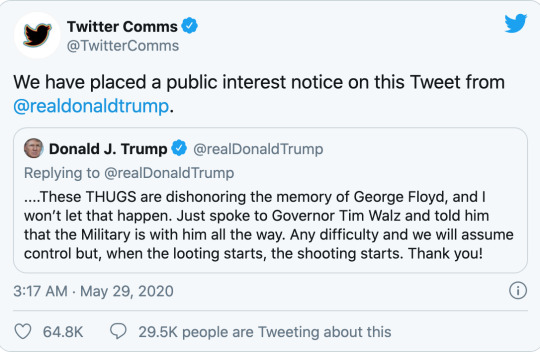
“The value of being in favor with people in power outweighs almost every other concern for Facebook,” said David Thiel, a Facebook security engineer who resigned in March after his colleagues refused to remove a post he believed constituted “dehumanizing speech” by Brazil’s president.
Facebook contends the use of incendiary populist language predates social media. Nick Clegg, Facebook’s vice president for global affairs and communications, said in a statement that populism wasn’t invented in Silicon Valley, pointing to centuries of political history before social media companies‘ existence.'
“From the Arab Spring to local candidates challenging political incumbents, social media has also helped to open up politics, not favor one side over the other,” Clegg added. “Studies have shown the drivers of populism are complex and cannot be reduced to the use of social media, in fact political polarization has fallen in many countries with high internet use.”
Facebook declined to make Zuckerberg available for an interview, although it pointed out that Zuckerberg opposed Trump when his Muslim immigration ban went into effect. The White House declined to comment.
Zuckerberg talks frequently about making choices that stand the test of time, preserving the values of Facebook and subsidiaries WhatsApp and Instagram for all of its nearly 3 billion monthly users for many years into the future — even when those decisions are unpopular or controversial.
At one point, however, he wanted a different approach to Trump.
Setting the stage
Before the 2016 election, the company largely saw its role in politics as courting political leaders to buy ads and broadcast their views, according to people familiar with the company’s thinking.
But that started to change in 2015, as Trump’s candidacy picked up speed. In December of that year, he posted a video in which he said he wanted to ban all Muslims from entering the United States. The video went viral on Facebook and was an early indication of the tone of his candidacy.
Outrage over the video led to a companywide town hall, in which employees decried the video as hate speech, in violation of the company’s policies. And in meetings about the issue, senior leaders and policy experts overwhelmingly said they felt that the video was hate speech, according to three former employees, who spoke on the condition of anonymity for fear of retribution. Zuckerberg expressed in meetings that he was personally disgusted by it and wanted it removed, the people said. Some of these details were previously reported.
At one of the meetings, Monika Bickert, Facebook’s vice president for policy, drafted a document to address the video and shared it with leaders including Zuckerberg’s top deputy COO Sheryl Sandberg and Vice President of Global Policy Joel Kaplan, the company’s most prominent Republican.
The document, which is previously unreported and obtained by The Post, weighed four options. They included removing the post for hate speech violations, making a one-time exception for it, creating a broad exemption for political discourse and even weakening the company’s community guidelines for everyone, allowing comments such as “No blacks allowed” and “Get the gays out of San Francisco.”
Facebook spokesman Tucker Bounds said the latter option was never seriously considered.
The document also listed possible “PR Risks” for each. For example, lowering the standards overall would raise questions such as, “Would Facebook have provided a platform for Hitler?” Bickert wrote. A carveout for political speech across the board, on the other hand, risked opening the floodgates for even more hateful “copycat” comments.
Ultimately, Zuckerberg was talked out of his desire to remove the post in part by Kaplan, according to the people. Instead, the executives created an allowance that newsworthy political discourse would be taken into account when making decisions about whether posts violated community guidelines.
That allowance was not formally written into the policies, even though it informed ad hoc decision-making about political speech for the next several years, according to the people. When a formal newsworthiness policy was announced in October 2016, in a blog post by Kaplan, the company did not discuss Trump’s role in shaping it.
In an interview, Bickert said the company ultimately made a call to maintain Trump’s Muslim ban video because executives interpreted Trump’s comment to mean that the then-candidate was not speaking about all Muslims, but rather advocating for a policy position on immigration as part of a newsworthy political debate. She said she did not recall the document where the options were presented.
Facebook’s Bounds added that the “newsworthiness” policy was added in 2016 after content reviewers removed a photo of a naked girl fleeing a napalm attack during the Vietnam War. “Our goal was to recognize the essential public benefit of preserving content that in other contexts wouldn’t be allowed,” Bounds said. “In the case of elected officials, it also ensures that they will be held to account for their words,” so that people can judge for themselves.
In spring of 2016, Zuckerberg was also talked out of his desire to write a post specifically condemning Trump for his calls to build a wall between the United States and Mexico, after advisers in Washington warned it could look like choosing sides, according to Dex Torricke-Barton, one of Zuckerberg’s former speechwriters.
The political speech carveout ended up setting the stage for how the company would handle not only Trump, but populist leaders around the world who have posted content that test these boundaries, such as Rodrigo Duterte in the Philippines, Jair Bolsonaro in Brazil and Narendra Modi in India.
“Though [Facebook] has cracked down on misinformation, the most problematic influencers are politicians,” said Claire Wardle, U.S. director of First Draft, an organization dedicated to fighting misinformation that has a partnership with Facebook to fact-check news articles. “You can do all the fact checking in the world, but these influencers have a disproportionate impact.”
Trump presented a unique challenge, she added. “Until then, no one would have considered a president who would have said those things.”
Protecting the right
After the election, it became clear Russia had used social media to sow disinformation. Facebook soon after became a frequent target of the president’s ire. He tweeted that the social media giant was “anti-Trump” and trying to undermine his victory.
At the same time, GOP leaders stepped up criticism that platforms such as Facebook and Twitter, with leadership ranks full of liberals, sought to limit the reach of right-leaning voices.
“There’s no credible research supporting Trump’s claim that social platforms suppress conservative content, but he still succeeded in getting them to revise their rules for him,” said former Facebook spokesman Nu Wexler, who left the company in 2018.
As Facebook scrambled to tackle foreign interference and misinformation, its executives in the nation’s capital argued that caution and deference was necessary to survive the new political environment, according to three people familiar with the company’s thinking.
Facebook’s security engineers in December 2016 presented findings from a broad internal investigation, known as Project P, to senior leadership on how false and misleading news reports spread so virally during the election. When Facebook’s security team highlighted dozens of pages that had peddled false news reports, senior leaders in Washington, including Kaplan, opposed shutting them down immediately, arguing that doing so would disproportionately impact conservatives, according to people familiar with the company’s thinking. Ultimately, the company shut down far fewer pages than were originally proposed while it began developing a policy to handle these issues.
How conservatives learned to wield power inside Facebook
A year later, Facebook considered how to overhaul its scrolling news feed, the homepage screen most users see when they open the site. As part of the change to help limit misinformation, it changed its news feed algorithm to focus more on posts by friends and family versus publishers.
In meetings about the change, Kaplan questioned whether the revamped algorithm would hurt right-leaning publishers more than others, according to three people familiar with the company’s thinking who spoke on the condition of anonymity for fear of retribution. When the data showed it would — conservative leaning outlets were pushing more content that violated its policies, the company had found — he successfully pushed for changes to make the new algorithm to be what he considered more evenhanded in its impact, the people said.
Isolated and divided
With the 2020 election on the horizon, Facebook and Zuckerberg’s hands-off approach to free speech was leaving it increasingly isolated in Silicon Valley.
In May 2019, Zuckerberg, citing free speech, refused to take down a doctored video of House Speaker Nancy Pelosi (D-Calif.) that made her appear drunk.
Facebook chief Mark Zuckerberg reached out to Speaker Pelosi. She hasn’t called him back.
That summer, company leaders held a meeting to revisit its newsworthiness exception, which until then had been determined on a case-by-case basis, with the most controversial calls made by Zuckerberg. Internally, some were unclear how far that leeway extended, according to two people.
Clegg, the company’s new head of global affairs and communications and a former British deputy prime minister, announced the outcome of that meeting at a speech in Washington in September 2019. Aside from speech that causes violence or real-world harm, Facebook would allow politicians to express themselves virtually unchecked on social media. Facebook’s network of independent fact-checkers, which had been established as a key part of the company’s response to disinformation, would not evaluate their claims and the community guidelines would largely not apply to politicians.
Facebook did not want to be an arbiter of truth in political debate, he said, echoing Zuckerberg’s long-standing position.
Facebook CEO Mark Zuckerberg says in interview he fears ‘erosion of truth’ but defends allowing politicians to lie in ads
The speech angered some employees, triggering more than 250 of them to sign a petition disagreeing with the decision because they thought it gave politicians a pass.
One former executive, Yael Eisenstat, who worked to improve the political ads process, wrote in The Post that the controversy was “the biggest test of whether [Facebook] will ever truly put society and democracy ahead of profit and ideology.”
She said that she routinely experienced how the company’s efforts at integrity were often undermined by “the few voices who ultimately decided the company’s overall direction.”
Meanwhile, in October, as Facebook faced more potential regulation and political troubles, Zuckerberg and his wife Priscilla Chan went to the White House for a private dinner with Trump, a part of the CEO’s effort to cultivate personal relationships in Washington.
Tweetstorm
As the pandemic and civil unrest dominated the first half of this year, Trump continued to turn to social media platforms to spread misinformation. He touted the unproven drug hydroxychloroquine as a possible cure for the coronavirus and claimed without evidence that the left-wing antifa movement was behind the violence at George Floyd protests.
Meanwhile, Facebook employees began challenging the company’s decisions.
Two months before Trump’s ”looting, shooting“ post, the Brazilian president posted about the country’s indigenous population, saying, “Indians are undoubtedly changing. They are increasingly becoming human beings just like us.”
Thiel, the security engineer, and other employees argued internally that it violated the company’s internal guidelines against “dehumanizing speech.” They were referring to Zuckerberg’s own words while testifying before Congress in October in which he said dehumanizing speech “is the first step toward inciting” violence. In internal correspondence, Thiel was told that it didn’t qualify as racism — and may have even been a positive reference to integration.
Thiel quit in disgust.
In May, following years of internal debate of its own, Twitter chose to go in the opposite direction. It labeled two misleading tweets by Trump about mail-in ballots with a fact-check label.
Twitter’s decision to label Trump’s tweets was two years in the making
Trump responded two days later with an executive order that could hurt social media companies by removing a key exception that limits their liability for content posted on their sites.
The next day, Trump tweeted about the Minnesota protests. Twitter quickly labeled the tweet for violating rules about glorifying violence, and Snapchat stopped promoting Trump’s account the following week. YouTube told The Post that it holds politicians to the same standards as everyone else.
Facebook, on the other hand, chose to haggle with the White House, asking for a deletion or a change, said the people. Axios first reported the call, which Facebook’s Bounds confirmed to The Post.
As employees raged on internal message boards and externally on Twitter, Zuckerberg told workers that Facebook’s policies might change again in light of Trump’s post. The company had rules allowing for “state use of force,” he said, but they were vague and didn’t encompass the possibility that such pronouncements could signal harmful aggression. Bickert’s team planned a series of policy meetings for the weeks ahead.
In June, Facebook removed a swath of Trump campaign ads with Nazi symbolism, after an initial internal assessment that found the ads did not violate the company’s polices, according to documents viewed by The Post. In meetings, senior executives argued that not removing them would be perceived as pandering too much to the president, according to a person familiar with the discussions.
Last week, the advertiser boycott picked up steam. Hershey, Verizon, Unilever, Coca-Cola and others said they were temporarily pulling ads.
On Friday, Zuckerberg told employees in a live-streamed town hall that he was changing the company’s policy to label problematic newsworthy content that violated the company’s policies as Twitter does, a major concession amid the rising tide of criticism. He also said in the most explicit language ever that the company would remove posts by politicians that incite violence and suppress voting. Still, civil rights leaders said his assertions didn’t go far enough.
“There are no exceptions for politicians in any of the policies that I’m announcing today,” Zuckerberg said.
Phroyd
14 notes
·
View notes
Text
FREQUENTLY ASKED QUESTIONS, BEST PRACTICES, AND TIPS FOR TWEETS
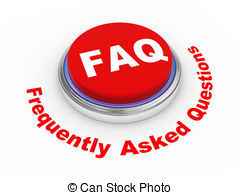
From @BenSoloTags
(Scroll down to see Best Practices and Tips)
Frequently Asked Questions

* How can I participate in a BenSoloTags campaign?
To participate in our hashtag campaigns, first, follow @BenSoloTags, our official twitter account to find out when they are planned. We suggest you turn on notifications for our account, so you can get notified whenever we tweet something official. You can do that by clicking the button with the alarm icon on it on our profile. We send out the official campaign notices from that account, including themes, time zones, best practices, and updates.
* Where can I suggest a hashtag idea for a future campaign?
Please send a tweet to @BenSoloTags if you have a campaign idea!
*How often do you do campaigns?
We try to do campaigns about once a month.
* Why don’t we do more campaigns?
Disney and Lucasfilm Ltd. (LFL) see a LOT of tags, 24/7/365. We’re working to present unique monthly tags that are fun, positive, and creative. Disney and LFL will certainly notice when we trend a hashtag, even if it’s once a month.

* Are you the only people doing campaigns?
No. There are other groups out there working to bring Ben Solo back to Star Wars. We’ll try to share information about specific campaigns and the accounts/groups promoting them, along with our own monthly hashtag campaigns.
Twitter contacts for some of the other groups include:
@kiara_solo
@KarolV14070769
@solosaberx

* Why do you list different time zones on your campaign schedule?
The way to get attention for our cause is to “trend” on Twitter. The easiest and best way to trend is to have the most people possible tweet the same hashtag at once. Fans all over the world want to take part in the campaigns, so we try to accommodate as many of them as possible. So, for example, people in Los Angeles are tweeting at noon local time, which is 3:00 pm in New York, 8:00 pm in London, 11:00 pm in Germany, etc.
* How do you decide which tag to use?
We have spoken with some social media experts who have experience with how corporations read social media. According to our sources, corporations like positive hashtags and public engagement. Companies tend to “tune out” what they consider “negative” hashtags, or even categorize them as spam so they remain unseen.
Therefore, using hashtags like #YouKilledMyFavoriteCharacter would not bring us closer to our goal of bringing Ben Solo back alive to the Star Wars universe.
Longer hashtags mean fewer characters to tweet with, so those would be limiting.
We try to make it fun as well as send a message to Disney/LFL. We had so much fun before TROS came out, and we’ve been so bummed since, that we want to promote enjoying each other’s content.

* Is every tag featured on the Ben Solo Tags twitter account sponsored by BST?
No. We try to let people know about campaigns hosted by other accounts, as well as the monthly BST tag. Anything that isn’t our campaign will have “FYI” at the beginning and links to find more information (where possible).
* Why don’t you use the same hashtag every time? One that everyone can remember?
According to “15 Shortcuts to Get Your Hashtag Trending on Twitter:”
“...if a trend goes on too long, it ceases to be a trend. Twitter prefers trends to last for a day or two at a maximum, and trends that go on for too long are no longer spikes in traffic; they’re a new baseline. There are hashtags with 5,000 tweets in a day, while other tags are getting 50,000.
“If your tag hasn’t trended within the first day of using it, it’s probably not going to reach that spike without some exceptional circumstances. It’s better to abandon it and try to get something else trending than it is to try to get an old tag to trend again later.”
Source: https://follows.com/blog/2017/04/shortcuts-hashtag-trending-twitter

* Why don’t you campaign for other characters besides Ben? Rey (Rose, etc.) deserves some love too!
As much as we feel all the sequel trilogy characters were given a hard shake by TRoS, Ben is the only major sequel trilogy character that died. So even if Rey and other characters suffered, they still have a (hopefully better-written) future. However, unless we can garner support to bring Ben back to life, his story ends where TRoS ends.
In light of this, our campaigns focus exclusively on Ben, or Ben as a part of Reylo, but we would love to support and help spread information about campaigns to celebrate other characters. Just let us know how we can help at @BenSoloTags.
* Why aren’t we allowed to use any art we find? If it’s on Pinterest, it’s fair game, right?
Well, no. Most artists don’t appreciate your re-posting their work without permission. The best way to share an artist’s images in a way that acknowledges their work is to retweet the artist’s original tweet from their account whenever possible. A direct tweet is better than a quote tweet. If you can’t find the original tweet, you can try asking the artist to repost their work so you can share it, or ask them to grant you the permission to repost it.

* Where are you on social media?
Twitter @BenSoloTags
Facebook Ben Solo Tags
Instagram BenSoloTags
Best Practices
Feel free to amplify the signal and RT the BenSoloTags tweet about the campaign with your own followers.
If possible, use ONE hashtag per tweet (two maximum), so the Twitter algorithm won’t filter out your tweet as “spam.”
Try to tweet during the time zone recommended for your country, but if that doesn’t work for you, participate when you can the day of the campaign. Do not use third-party services or bots to tweet for you.
Retweeting other hashtag tweets helps the tag trend, but don’t go crazy. If you retweet too fast, you will get put in Twitter retweet “jail” for up to 72 hours for “suspicious activity.”
Never tweet the hashtag alone. Made sure to add some text or a picture to your tweet. Otherwise, it will be filtered out as “spam.”
Tweets with a visual component work especially well and get retweeted more often. You can include your own artwork or semi-official/official photos from the movies or of the actors.
Only share fan art from the artist’s original post or with their permission.

Tips for Tweeting with the Current Hashtag
Here are just a few ideas for creative, fun campaign hashtag posts:
Post photos of yourself with friends and family.
Fanfic writers - share a sample of your work or a URL of one of your stories.
Create memes and/or photo manipulations.
Create and share photos with appropriate quotes and/or poetry (your own or your favorite poet’s).
Share pictures of your own Ben Solo/Star Wars cosplay.
Express what you love about Ben Solo or how you feel about him.
If you’ve written a letter to an actor or one of the filmmakers, you could share it or a sample of it.
Edit your favorite Ben Solo film scene, or create a Ben Solo-themed music video; post it or a link to it.
Take a photo of yourself or a friend with a Rey-inspired hairstyle or a Kylo inspired pose...or vice-versa!

Please Do NOT tag official Disney or Lucas Film accounts or those of their employees.
PLEASE - DO NOT FEED THE TROLLS! Do not engage with them. Your replies count as negative discourse and may be used to invalidate the tag by the algorithms.
Please be respectful of others.
And most importantly, have fun sharing your love and enthusiasm for Ben Solo.
Never tweet the hashtag alone. Made sure to add some text or a picture to your tweet. Otherwise, it will be filtered out as “spam.”
Tweets with a visual component work especially well and get retweeted more often. You can include your own artwork or semi-official/official photos from the movies or of the actors.
Only share fan art from the artist’s original post or with their permission.

Please Do NOT tag official Disney or Lucas Film accounts or those of their employees.
PLEASE - DO NOT FEED THE TROLLS! Do not engage with them. Your replies count as negative discourse and may be used to invalidate the tag by the algorithms.
Please be respectful of others.
And most importantly, have fun sharing your love and enthusiasm for Ben Solo.

2 notes
·
View notes
Text
RE: Binary Life Binary Strife or “You Look Happy”
It’s been about two years since I started HRT. During that time, I’ve taken monthly progress photos. At first, it was to keep a log of how I changed so that I could show my parents how I’m still their kid when/if we reconciled. Selfishly, I also post them on my social media because the positive feedback I started getting helped me cope with my own frustrations and dysmorphia. One thing I’ve noticed is that the feedback, especially the feedback from cis women, is typically about my appearance. It’s either my nails being nice, my skin looking softer, etc. It’s always specific things about my presentation and thankfully usually positive.
I have a complicated reaction to this kind of feedback. On one hand, I am a very binary woman. I don’t consider myself super femme, but I wear makeup, put effort into my nails, understand contouring, etc. It feels good to have those things noticed and affirmed by cis women. Even though I have no romantic or sexual interest in men, it also feels good to have men tell me that I’m attractive. It’s like a cis-shaped stamp of approval on my gender and it feels nice. It’s a fluffy feeling that all the time I spent watching makeup tutorials, developing a new wardrobe and learning how to draw my eyeliner straight was a good use of time.
On the other hand, I don’t like that I like it. After the initial fuzzies are gone, I feel empty. I wish I didn’t want that kind of attention and affirmation. Once the approving gaze is gone and I’m left alone with my thoughts, I’m aware that there is a hole in me that is no longer filled. Moreover, would these people be as willing to validate my femininity if it wasn’t so conventional? If I had a less traditional style would I still have people using she/her pronouns for me without any poking or prodding. It’s not just about femininity, it also feels like the validity of my transition might be called into question if I had more masculine mannerisms and presentation. Even if that isn’t true, the anxiety that comes from wanting to live up to cultural ideals and the pressure of internalized -isms are still there. If anything, there is no single better judge of whether coloring within the lines than me.
This past week, a trans youtuber deleted her twitter in response to a backlash from a series of tweets she made where she appeared to dismiss the existence of non-binary people. This recent exchange came on the heels of a years long discourse in her videos. I have a complicated relationship with Contrapoints. She started her process a few months before me so when I was early into HRT, I found that some of her videos were touching on topics I was also coming to grips with about myself and my future. It helped me to feel a little less alone before I had a queer community of my own. However, it’s now been about 2 years since she started her transition and I imagine we are both in very different positions. Looking over the course of her videos, it’s not hard to imagine that we took different paths at forks in the road.
Awhile back she put out a video titled aesthetics where two characters take opposing positions on whether gender exists apart from performance. One character takes the perspective that someone presenting entirely masculine but using she/her pronouns is just as valid as a woman presenting high femme. The other character takes the perspective that gender exists in the eye of the beholder. Based on her now-deleted notes for the video, the “gender is in the eye of the beholder” character was intended to be dispensing hard-truths about the reality of gender to a naïve trans person. The socratic format of her videos hides her own opinion on the subject, but her notes and tweets give the impression that she has since leaned more into a position where gender, and the validity of gender, is contingent on presentation. I remember when she used to explicitly say she didn’t care what pronouns anyone used for her and is now tweeting to complain about the minor inconvenience of being asked her pronouns and not just having them assumed.
So how does this come back to me. I’ve leaned into the other side of things. There is a part of me that feels insecure and craves the affirmation of other people. However, I don’t think that’s a good thing and I think I have a lot to learn from the “zoomer trans vanguard” that she’s complained about in tweets. I think that gender is an evolving conversation with yourself and the world. My binary self of the moment might be very different months or years from now. Trying to force myself into a box to fit another person’s expectations, or my own internalization of those expectations, feels like a process doomed to failure. There are times that I’m worried about wearing pants to a meeting or whether my outfit could be perceived as more masculine even though I think it’s nice and comfortable. I want to grow on this front and find a way to fill that void in myself with validation of me from me instead of looking to other people to affirm that my eyeliner is sufficiently straight.
I wanted to close this one with a story because it doesn’t feel like enough to warrant it’s own post. One morning, a friend from high school that I hadn’t spoken to in the better part of a decade messaged me out of the blue via facebook while I was doing my makeup in the morning. He led off with something to the effect of “I don’t think we’ve ever met but I guess maybe someone is pranking me and just adding hot women again.” There were a lot of feelings. Reminder that I went to an all-boys high school. Second, I had no idea what to say and was afraid that I was going to have to disclose my transition to someone without having any idea how he might react. After typing out a response and deleting it a half dozen times, they realized what was going on. I caught whiplash from how quickly he went from questioning whether I was even a real person to realizing that we went to high school together. I was afraid that I was about to catch some transphobic nonsense first thing in the morning, but instead they actually came out to me as bi and told me how a lot of their issues during and since high school stemmed from feeling like they had to be closeted to people. I felt so much relief and before we split he made sure to tell me that the photos I had posted were the first time he ever saw me smile like I meant it.
Outside of my own policing and my relationship with comments about my body, I’ve noticed a trend from other queer people. It’s especially true of queer people that have known me since before I transitioned. In these few cases, they don’t comment about my appearance. Instead, they tell me I look happy. I try to pass that on to other people. It feels like a good energy to put into the world. It also feels like a good energy to take into myself. I want to be happy.
1 note
·
View note
Text
Guide to understanding Pay per Click advertising
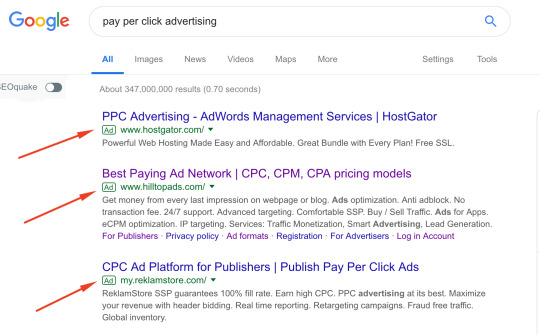
Pay per click advertising has been around over the last two decades and have seen a lot of transformation.
PPC has evolved a lot basically the way PPC giants such as Google, Yahoo, Bing and Amazon has adjusted their PPC advertising tools constantly to ensure enhanced performances.
It is always important for online advertisers to follow-up and be updated as much as possible in order to be able to run more effective PPC campaigns.
In this post, I will guide you through the process of formulating and running successful PPC or CPC campaigns.
Let's jump into it...
What is Pay Per Click Advertising?
First things first. Let's understand what is pay per click advertising.
Pay Per Click (PPC) advertising is also known as Cost per click (CPC) advertising it is an online advertising model used by both the advertisers and the publisher as a pricing model to sell or buy traffic.
The advertiser is required to pay for the traffic sent by the publisher which in most cases the publisher is a website owner or a group of websites inclusive of blogs.
Advertisers often buy specific targeted traffic that is relevant to their niche or market type.
Pay per click advertising usually send traffic through banner ads, Text ads, Interstitial Ads, In-App ads across mobile and desktop devices. Other forms of utilising PPC Advertising is through Pop-Up Ads, contextual ads, links etc.
Pay per click advertising or cost per click advertising is largely controlled by search engine giants such as Google (Google Ads), Bing and Yahoo Bing and Yahoo Ads). These search engines display these ads on their various platforms.
How PPC advertising works will be discoursed in detail below...
The image below shows how Pay per click Ads appear in Google results.
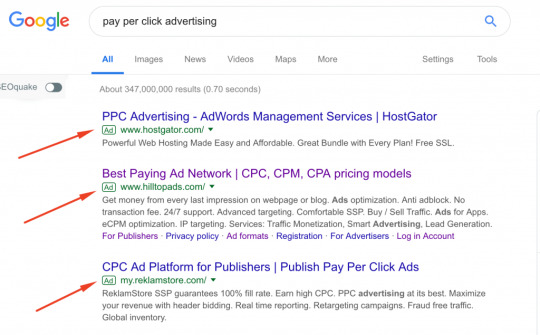
Pay Per Click advertising
Pay per click Trends
PPC trends shows the evolution process of PPC advertising. The online PPC community could testify that a lot has changed over the past years. In particular, 2018 witnessed a lot of changed in online PPC such as,
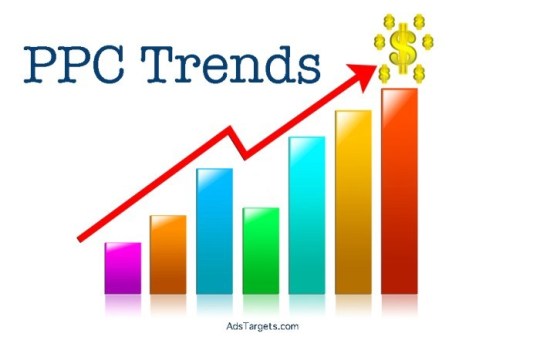
PPC Trends
Google rebrands her online advertising from "Google AdWords" to "Google Ads". This change was accompanied by a lot of features within the systene much as creating various types of campaigns, enhancements, and targeting options making creating and targeting campaigns more effective.
Bing also followed the same way in their PPC advertising system making it more convenient to create and manage campaigns with the more efficient reporting system.
LinkedIn on the other hand also implemented profile targeting system in 2018 while Amazon has received more PPC Ad budget as advertisers noticed more products search taking place on Amazon.
How does Pay Per Click Advertising work?
PPC advertising or cost per click advertising works by using highly technical IT systems designed by various Ad Networks. Although each of these systems works differently, they all have one thing in common which is generating clicks for the advertiser.
PPC or CPC pricing model
Cost per click advertising works on two popular models which is known as the Bid-based CPC and Flat-rate CPC.
In each of the models, the advertiser's sign's up with the Ad publishers which in most cases is an advertising ad network.
The registration also includes an agreement which allows each advertiser to indicate or choose how much money they are willing to pay per certain keyword or keyword phrases.
The Ad network system then automatically ranks advertisers bids and show them when a quarry is entered in the search engines.
To break it down further...
For search engines such as Google, Bing and Yahoo. These Ad giants use a bidding system that allows advertisers to bid for keywords that are related to their niche or market.
The bid system works in favour of the advertiser that pays higher for a certain keyword or keyword phrases. These Ads are displayed on top or below search results.
On the other hand, websites owners or bloggers charge advertisers a fixed amount to place banner ads, interstitial ads or Text Ads within a given time frame. Ad operate in a similar way such as search engine while also they have the capability to charge a fixed amount per click as well.
Pay Per Click advertising Check list
In every project, there are set of activities which involves proper planning and management for those budget to be successful. This same ideology is applied for PPC campaigns in other to reap the full benefits of PPC advertising.
This checklist entails how the cost per click campaigns should be planned and managed Daily, weekly, Bi-Weekly, Monthly and Quarterly.
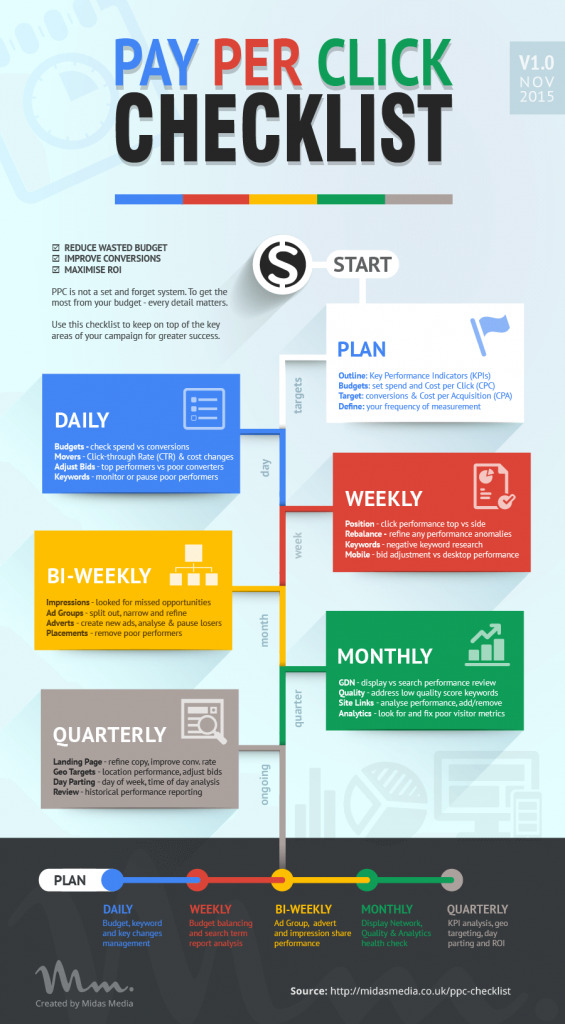
Infographic credit: Media media
Planning Pay per click
Planning your PPC campaign entails the following
Outline Key Performance Indicators (KPIs)
Budget your estimated campaign spend and approximate cost per click you expect to spend on your campaign.
Set your target for conversions and acquisitions (CPA)
Define your frequency of measuring your campaign
Daily checklist
Daily monitoring and optimization is done by checking the daily spent and the conversions.
Movers: Click through rates and changes in the cost
Bid Adjustment: Adjust Ad bids based on top performance and poor converters
Keywords adjustment: Monitor and adjust poor performing keywords
Weekly checklist
Position: Click performance top verses side
Rebalance: Refine performance anomalies
Keywords: Negative Keywords research
Mobile: Mobile bid adjustment versus desktop performance
Bi-Weekly Checklist
Impressions: Search and update missed opportunities
Ad groups: Split out, narrow and refine
Ads: Create new Ads, analyse the existing ads and pause poor performing ads
Placement: Remove or poor performing Ads
Monthly checklist
GDN: Display verses search search performance review
Quality: address low quality keywords scores
Website links: Analyse performance, Add or remove
Analytics: Search for poor visitors and fix metrics
Quarterly checklist
Landing pages: refine copy, improve conversions rates.
Geo targeting: location performance and adjust bids
Day parting: Day of the week and time of the day analysis.
Review: Historical performance analysis.
How to Calculate Pay per click advertising?
To understand how PPC or cost per click advertising is calculated is very simple. This is done by dividing the cost of advertising by the number of clicks from a particular campaign.
The formula is as follows: pay per click ($) = Advertising cost ($) / number of clicks (#). Doing so will give you an insight on how much your PPC advertising campaign actually cost.
PPC Advertising cost OR CPC advertising cost
PPC advertising cost Or CPC advertising cost is simply the specified cost of running a PPC or CPC campaign in a given period of time. These advertising cost can vary besed on when the advertisier decides to analyse their cost of advertising compared to the performance of the Ad campaign.
Types of Pay per Click Advertising
There are various forms of PPC advertising also known as CPC advertising. They come in various forms of online advertising and the most popular ones are Banner advertising also known as Banner Ads, Text advertising or Text Ads, Interstitial Advertising or full-screen Ads, mobile and in-app advertising.
The example of these PPC advertising types will be briefly discussed below as follows...

Banner Advertising PPC.
PPC Banner advertising is a form online advertising that allows advertisers to design banners with promotional information and display them on publishers channels.
Banner advertising is arguably one of the oldest forms of online advertising. It is still one of the most popular among online marketers. The reason for this is simply because they are more attractive and eye-catching for visitors.
The most popular banner sizes are the 728x90, 300x250, 160x600 and 468x60 while there are many other banner sizes. These banner sizes are also known to be most converting ads.

Interstitial Advertising PPC
Interstitial PPC advertising also known as full-screen advertising is mostly used on mobile devices to get the full attention of the visitors. They appear on full screen or mostly covers 70% of the screen with the possibility of closing them down or it automatically disappear after few seconds.
Interstitial Ads comes in various sizes. The most popular once are 320x480 and 480x320 for mobile phones while 1024x768 and 768x1024 are more suitable for tablets.

Mobile advertising PPC
PPC Mobile advertising have grown significantly in the past five years. This is patly because of the dramatic increase in mobile use by internet users. Google reported in 2015 that mobile search surpase desktop searches made in their search engine.
This made Google and other search engines lay more emphases on mobile devices. It presented online advertisers the opportunity to target mobile users and increase their sales and ultimately profits.
Because most people carry their mobile devices with them all the time. online advertisers has also been doing their best to target mobile users while implementing various mobile Ads targeting strategies.

Text Advertising PPC
CPC Text advertising has also come a long way making it one of the oldest and the most popular form of PPC online advertising. Text ads are mostly used by Google and other search engines.
These text Ads are mostly displayed on top and bottom of google search results. Google also display PPC Text Ads on YouTube and publishers blogs and websites all over.
Pay per click advertising Agency
These are pay per click advertising Ad networks such as AdsTargets offering advertisers the opportunities to run their PPC campaigns.
Also, there are a lot of advertising agencies which helps small businesses to run, monitor and optimise their PPC or CPC Ad campaigns for a monthly feel. These are all classified as Pay per click advertising agencies.
Benefits of Pay per click
There are numerous benefits brands get from PPC or CPC adverting. Nowadays, most brands have dedicated pay per click budgets and put them to use year round. It is one of the reasons why Google makes over 100 billion dollars why Facebook makes over 40 billion dollars.
The benefits are as follows
PPC advertising give brands online visibility;It increase their online exposure which makes impact on their off-line; exposure as well. Brands that engage in CPC advertising increase their sales and conversions;It enable fast growth for brands
Conclusions
We have covered pay per click or as you like cost per click here but will be very happy to know what you think about this online advertising concepts.
Suggestions with the most recent updates about PPC or CPC are welcome so we can improve the quality of this post and keep it as fresh as possible.
Read the full article
3 notes
·
View notes
Text
Yana Toboso’s Writing Style: The Good, The Bad, and The Ugly
I’LL STOP WRITING LONG WINDED KURO POSTS WHEN I’M DEAD.
I do my best to stay out of Kuro discourse because...I just hate it and find it’s usually about stuff that’s pretty trivial in the grand scheme of things. But within the past several months I’ve noticed a new point of contention is the author herself, which I think is an actual good point of contention because it opens up an interesting conversation about the work as a whole and how/why Kuro is the way it is (aka good, bad, and...tonally confused to say the least).
And just to make things perfectly clear, this is an opinion piece about Yana Toboso’s strengths and weaknesses as a mangaka. This is not me telling people that they’re viewing the series all wrong and that I’m right. I just want to open up a discussion (in fact, I welcome people disagreeing with me, I just want it to be clear that this is not an attack on other people’s opinions, it’s just my opinions).
Lots of text under the cut.
I’m going to start with what I like about Kuro, since I’ve been reading it for like, 5 years and own 25 volumes of it (including one I just bought like 2 weeks ago).
The Good:
What I think is by far Yana’s biggest strength is her characters. They all have very distinct personalities, but aren’t just one note. There’s also a lot of them; one thing that struck me when I reread all of Kuro was just how big the cast is and how it feels even bigger because a very large portion of the cast have their own arcs, whether it be during the course of the series or in their backstories (or both).
Even the villains are a really good variety of comedic, evil/scary, and sympathetic (except maybe the first mobster guy but the first arc kinda sucks anyway and is mostly just for plot establishment. And I guess the curry contest guy kinda sucks too but that arc is all about Soma and Agni so I can give it a pass). Baron Kelvin is piss-your-pants terrifying in his appearance, actions, and behaviour, but still has a backstory that isn’t at all sympathetic but makes you understand his motivations.
I think that’s the key for all of the villains/characters in general; everyone has motivations that make sense even if they’re not relatable.
I also think the fact that most people in the fandom want spin-offs (about the reapers, Vincent and Dee, the servants, the season 2 cast, etc.) is indicative of how good these characters are. There’s a sense that most of them could hold their own story.
I also think that the characters interact well with each other, whether it be in a fun way or a more serious way. Narrowing it down to the 2 mains, one aspect of Kuro that keeps me coming back is how Ciel and Sebastian work off of each other with their dialogue and general attitude towards each other. They’re both in a weird position where they kind of hate each other (Seb finds Ciel annoying and troublesome while Ciel is always a little afraid of Seb) but also need each other (Ciel needs protection/a weapon of mass destruction, and Sebastian needs food). Due to this weird situation, they’ve developed this comedic dialogue that’s kind of born from their repressed emotions. TBH the way they work off of each other has made them my favourite sherlock/watson duo.
The only flaw with the character writing I think is Sebastian, who’s kind of inconsistent. But chapter 137 served as a kind of reminder that his human personality is 100% an act (aside from maybe his cat fascination...). But yeah, for the most part Kuro has a top notch cast.
Another thing I think Yana is really good at is foreshadowing. This might be a touch contentious, but I maintain my earlier stance that a big reason people hate the 2ct being canon is because of expectations and the fact that it’s a cliche is western culture (and personal taste, of course). Rereading the series was unbelievable because there were so many “AHA” moments and “how could I have been so blind?” moments. I think any plot twist that makes you go back and read a series and say “ooooh thaaaat’s what that waaaaas” like 90 times had some good set up to it. (Actually rereading the Campania and the Green Witch arcs made me feel like it might have even been too obvious...but a lot of people still didn’t catch it so, kudos).
Even in the Curry arc there’s tidbits of foreshadowing for the servants backstories, and I’m sure other speculation that’s going on right now will have some pay off in future chapters (some of it, anyway). All in all, the series made for a great second go because of all the little hints that can be caught once you know future plot points.
Yana Toboso also has a lot of really good ideas. The execution can go either way, but the concepts of most (definitely not all) of the Kuro arcs are like...really great. Some of them are these alternate spins on history that come from these creative supernatural elements (side note: I like how the zombies in the kuro-verse bite people because they want to consume a soul, but can never succeed. It’s both creative and a little fucked up). Or then there’s something like the Green Witch arc that plays out like a Scooby Doo episode but it’s got all of this weird stuff about war and poison and psychology and dreams and other good shit. Even though I think the cricket match went on for way to long, I’ll admit that the idea of this evil genius murderous noble achieving his goals by cheating at the worlds most boring sport is kind of funny.
I hate the boyband arc though I’m sorry that was not a good idea i hat--
Despite some fan-servicy bits (which I’ll talk about A LOT later) Kuroshitsuji feels like a passion project. This is pure speculation, but if you read the extra behind the scenes bits in the manga volumes, Yana talks about all of the books she read to prepare for this, or how she actually took cricket lessons with her editor despite the fact that they were awkwardly old to be in beginner lessons. She also did a shit ton of work for anime-only character designs and other promotional stuff while still publishing a chapter every month.
Even without the “behind the scenes” stuff, the amount of references that can be found in her work and the fact that she never misses a month even when she’s publishing bonus chapters gives off the sense that she cares about this.
Though again, 100% speculation.
I also hugely appreciate the mixture of comedy and tragedy in Kuro. (It opens up some problems, but we’ll get to those later). It’s not a slog to get through but it also doesn’t feel...pointless? I guess?? It’s mostly a dark comedy with action-y moments that then becomes a genuine horrific tragedy. It’s kind of hard to explain why I like this combo, but if it helps anyone relate to what i’m saying, it’s like the tone shifts in Angel Beats and how that show is both enjoyable and a total cry-fest. Same with Kuro except with different genre trappings. There’s a sense that anything could happen since it’s not all tied to one tone. Tone pieces definitely aren’t a bad thing, but I like the huge variety that can be found in this one series.
That being said...
The Bad:
I’ve said this approximately 37359767 times on this blog, but I’ll say it again.
Kuroshitsuji has a pacing problem. A really bad pacing problem.
There’s literally an arc where Ciel goes to a school, makes some enemies Mean Girls style, plays sports, and then finds out the bad guy is the same bad buy from the last arc who’s plans have changed only slightly. This is one of the longest arcs in the series.
This. Strikes me as a bad idea from a structural standpoint. The arc isn’t really a bad idea, but it’s like...a 2 volume idea, y’know?
I’ve already talked at length about how bad the pacing of the blue cult arc was so i won’t repeat myself but, yeah. Unbelievable waste of time also huge missed opportunity for a Phantom of the Opera spoof like are you kidding me ALL OF THE PIECES WERE THER--
A lot of people complain about the Green Witch arc’s pacing since it’s really long and has a weird act structure (which it is and does respectively). This is something that doesn��t bother me at all but I feel like it’s worth bringing up since it bothered a lot of people, so maybe it’s something I just don’t see.
Also even though I like the mix of comedy and horror/tragedy, sometimes it doesn’t flow very well. This is especially apparent in the boyband arc, where the jump from stupid to serious is break-neck, and the lack of interesting events that happen in the school arc.
Kuroshitsuji is also at a disadvantage being a monthly publication instead of a weekly one, which makes the stretched out parts feel even more stretched out. It isn’t tailored to this release schedule (although I wouldn’t know how to fix this particular problem other than to just...tighten things up pacing wise).
Yana also has a tendency to expect her readers to read her mind. What I mean by this is that she’ll say things on twitter/her blog like “Sebastian is the main character of Kuro” or “Ciel and Sebastian have no emotional connection,” and like a million other things.
....She says it like it’s obvious but if you go on tumblr or forums or anywhere...clearly not everyone sees these things and will often ask questions about her posts because they seem so not-obvious.
Which is super weird because (if I remember correctly), she once said that people can interpret her work however they want, but she seems to be actively discouraging that.
This is another thing that makes me think Kuro is a passion project. It’s like she feels the need to make sure everyone sees everything that she’s thought of...but it doesn’t work if it’s not actually weaved into the narrative, then it’s just confusing.
This bothers me a lot because as a university English Major I’ve had “Death of the Author” drilled into my brainstem and Yana’s actively fighting me on it. Please make things more obvious in your story if you want readers to understand them.
Of course there’s a bunch of supernatural inconsistencies like “if Sebastian/the reapers/this supernatural thing could do this, why couldn’t they do this? how does this work?” (like, it’s implied that the reapers can make themselves invisible to humans if they want...so why do Grell and Ron show up to the Campania in full visibility? All the time?). Stuff like this is a problem with literally every supernatural story ever, so I try not to harp on it, but it’s there.
Tiiiiiiime for the most contentious topic.
The Ugly:
I’ll say this a bluntly and straightforward as I possibly can: Kuroshitsuji is kind of perverted.
It is.
While the rumour that Kuroshitsuji was supposed to be a yaoi has been thoroughly debunked, Yana did used to draw BL staring young boys under the name “Yanao Rock.”
....Yeeeaaaah it unfortunately comes through in Kuro. The unbelievably infamous corset scene is played as a joke, but it is the most perverted joke in the history of the universe.
One thing that blows my mind (in a bad way) is that one panel where Ciel’s having an asthma attack (you all know exactly what I’m talking about) and it can be so easily seen as looking pornographic when out of context. There’s also that recent cover page (I believe for chapter 136?) where RC and OC are lying in a kind of state of undress and they look really pretty even though the context is horrifying.
Also that scene of RC swallowing the ring is drawn really pretty which is...a weird scene to have drawn really pretty.
i’ve heard people say that this all means nothing and we’re all reading too much into it, which I don’t buy for a second. I’ve also heard people say it’s for fujoshi fan service to which I’m kind of like....maybe?
This is based on 100% speculation, not at all fact, but I think the most obvious explanation is Yana is drawing beautiful boys in weird positions because she’s good at/likes drawing beautiful boys.
I’m not saying this is a good thing or an ironclad excuse, because it’s noooot. It comes across as pretty tasteless, especially given recent developments. It reminds me of the snake arc in Bakemonogatari or the weird shit that’s in the Made in Abyss manga; like this sexual shit feels very odd in these stories but there’s a sinking feeling that the author threw it in for their own enjoyment, like they were maaaybe trying to be sneaky and failed.
That being said, in that one particular scene in chapter 135 that actually deals with legit sexual abuse, I...didn’t think that sexualization felt perverted outside the context of the narrative (IT DEFINITELY WAS PERVERTED WITHIN THE CONTEXT OF THE NARRATIVE, DON’T GET ME WRONG). And this isn’t just going off of Yana’s bullshit tweet because, like I said earlier, these things should be clear to the audience within the work itself. It was nasty as fuck, but I could see a scene being portrayed similarly in something like Berserk or Game of Thrones or any grim dark story, and no one being as mad at the creator BUT
BUUUUUUUUT that’s the issue! Kuroshitsuji is not Berserk or Game of Thrones! The issue with the series being a tonal cluster-fuck is that scenes about explicit sexual assault don’t fit in a black comedy formula so it feels weird. THIS ISSUE IS EXACERBATED GREATLY BY THE LACK OF TACT DISPLAYED IN OTHER SCENES THAT CAN BE READ AS/ARE SEXUAL. Yana made it really hard for this scene to be okay by being all loose with tone and the visual presentation of younger male characters earlier in the series.
Huge problem. Very unfortunate.
Conclusions:
I felt compelled to make this post because Kuroshitsuji is a series where the artist is not abstract. With most shows or movies people say “that movie was good” or “that show was bad” or whatever. But in Kuro discourse it’s always “Yana Toboso did bad” or “Yana Toboso did good.”
I’m not saying this is bad....(in fact it’s probably good since Yana (and K-san) are being rightfully complimented/dragged based on the merit of their work) It is interesting, though, that Kuro discourse made a sliiiight shift from the work to the author. So, this was me trying to tie the author and the work together.
Thanks for coming to my TED Talk.
212 notes
·
View notes